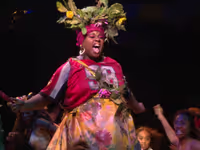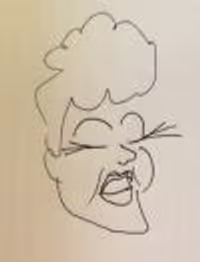Parts of A Show That I Never Got
#175I've never understood the part where . . .
Posted: 10/19/15 at 2:35am
I haven't seen IF/THEN since it was in previews in DC. At that point, it confused almost everyone. The part that mystified me is why the female couple (originally Jenn Colella and LaChanze) broke up in one timeline and not in another -- I thought the differences between the timelines resulted from different actions that Elizabeth took. I could think of nothing that would have caused the split in one timeline. OTOH, for the male couple, it was obvious -- Liz (at least I think it was Liz, and not Beth) got together with the Anthony Rapp character in one of the timelines, preventing him from getting together with the man he ultimately turned out to love.
Can someone explain this? Is it still in the show?
#176I've never understood the part where . . .
Posted: 10/19/15 at 9:33am
I only saw it once when it was running, so I may be mushy on the details, but I’m pretty sure that in both storylines, Colella’s character cheats on LaChanze’s character, but in the one timeline they remain broken up. In the other timeline, because Menzel’s character just went through the almost-plane crash, she helps them see that loving each other is the important thing (“Love While You Can”). Without Menzel going through that plane scare in the other scenario, she didn’t intervene to try to help the ladies work it out, hence how her life effects whether they stay together or not.
Others, correct me if I’m wrong on this.
Updated On: 10/19/15 at 09:33 AM
Bell0708
Stand-by Joined: 7/23/13
#177I've never understood the part where . . .
Posted: 10/19/15 at 11:51am
I never understood at the end of Wicked when Madame Morrible says, "She was a child of both worlds" when they realize the Wizard is Elphaba's father, because the Wizard didn't have any powers.
#178I've never understood the part where . . .
Posted: 10/19/15 at 12:14pm
theminutepast said: "I've never understood what the feeling is supposed to be at the end of "Nothing" from Chorus Line when Morales sings that she cried after Karp's death yet felt nothing. Is this the ultimate payback - that she feels nothing for a man who called her nothing? Or is she honestly sad about feeling nothing about his death? But then, why does she cry unless she's making a point about how good an actress she is now?
I always read that as she cried not because she was sad that he died, but she was upset at herself that she felt nothing
I have nothing to support that tho so I am curious what others think
"
Pasdechat
Understudy Joined: 4/17/14
#179I've never understood the part where . . .
Posted: 10/19/15 at 12:32pm
moviedude, I understood Morales like you did, being sort of shocked with herself for not feeling anything.
In Miss Saigon, I don't get the line "at night everything that's not him [Chris] disappears behind my door", sung by Kim in "Please". Through context, is she referring to men who come to her (being a "bar girl")? Also later after finding out about Chris being married, she sings to the Engineer "in all his [Chris'?] dreams he saw our baby, and he's teaching him to fly paper dragons in the sky" - other than paper dragons being some sort of Asian theme (what, though?) , what is she saying?
Updated On: 10/19/15 at 12:32 PM
TerrenceIsTheMann
Broadway Star Joined: 9/28/15
#180I've never understood the part where . . .
Posted: 10/19/15 at 12:36pm
Miss Saigon has a lot of lyrical problems in the first place. Then you have to add the fact that Kim is essentially hysterical once Chris leaves. Thats where all that paper dragon stuff comes in. The "disappears behind my door" would appear to be about other men, but that is not what is actually being implied. She is implying that without Chris being around, she is never 100%.
#181I've never understood the part where . . .
Posted: 10/19/15 at 1:07pm
Bell0708 said: "I never understood at the end of Wicked when Madame Morrible says, "She was a child of both worlds" when they realize the Wizard is Elphaba's father, because the Wizard didn't have any powers."
Omg wait whoa. How have I seen the show so many times and never realized this line makes no sense?
#182I've never understood the part where . . .
Posted: 10/19/15 at 1:15pm
GilmoreGirlO2 said: "I only saw it once when it was running, so I may be mushy on the details, but I’m pretty sure that in both storylines, Colella’s character cheats on LaChanze’s character, but in the one timeline they remain broken up. In the other timeline, because Menzel’s character just went through the almost-plane crash, she helps them see that loving each other is the important thing (“Love While You Can”-). Without Menzel going through that plane scare in the other scenario, she didn’t intervene to try to help the ladies work it out, hence how her life effects whether they stay together or not.
Others, correct me if I’m wrong on this."
Yes, basically in the Liz storyline (no plane crash) they didn't bother her with their relationship struggles because her husband had just died. Thus they remain broken up. Liz even says something like "if I had known ..." So the events of her life (results of her choices) impact them differently in both storylines.
#183I've never understood the part where . . .
Posted: 10/19/15 at 1:15pm
BroadwayConcierge said: "Bell0708 said: "I never understood at the end of Wicked when Madame Morrible says, "She was a child of both worlds" when they realize the Wizard is Elphaba's father, because the Wizard didn't have any powers."
Omg wait whoa. How have I seen the show so many times and never realized this line makes no sense?"
I think it makes sense. Elphaba's mother is Ozian, her father is a visitor from another world. Thus she's a child of both worlds.
AEA AGMA SM
Broadway Legend Joined: 8/13/09
#184I've never understood the part where . . .
Posted: 10/19/15 at 2:04pm
AHLiebross said: "I haven't seen IF/THEN since it was in previews in DC. At that point, it confused almost everyone. The part that mystified me is why the female couple (originally Jenn Colella and LaChanze) broke up in one timeline and not in another -- I thought the differences between the timelines resulted from different actions that Elizabeth took. I could think of nothing that would have caused the split in one timeline. OTOH, for the male couple, it was obvious -- Liz (at least I think it was Liz, and not Beth) got together with the Anthony Rapp character in one of the timelines, preventing him from getting together with the man he ultimately turned out to love.
Can someone explain this? Is it still in the show?"
It wasn't her sleeping with Anthony Rapp's character (Lucas) that prevented him from getting together with Jason Tam's character (David). It was because in that time line he never met David. David was a friend of Josh (James Snyder), so without Liz being with Josh then Lucas and David could never meet.
#185I've never understood the part where . . .
Posted: 10/19/15 at 3:46pm
About the DREAMGIRLS thing, in context of the show, she is not talking about her leaving the group. She's not going (from the relationship she has with her man). Yes, she does care about leaving the group but what matters more is someone who finds her attractive (who is fat, poor and at the time black was also considered lesser). There's that and just because she wants the relationship to keep going doesn't mean it will. She says no, but he's gone.
#186I've never understood the part where . . .
Posted: 10/19/15 at 11:13pm
In regards to the "buying gravity" thing in Wicked, the way I see it is as follows. She says "if that's love, it comes at much too high a cost, I'd sooner buy defying gravity". She's basically saying she's more apt to "buy", or believe, defying gravity as the more realistic option. Not the best metaphor, but it gets the job done I suppose. Then she flies and belts her face off and nothing else matters much for a few moments.
#187I've never understood the part where . . .
Posted: 10/20/15 at 12:12am
Thanks, folks, who set me straight on IF/THEN. It sounds like post-DC rewrites resolved these confusing issues.
I don't know how I missed this one before, because it comes from "The Phantom of the Opera," my all-time obsession. After Carlotta croaks like a toad during the opera "IL Muto," and the managers promise that Christine will step in in a few minutes, they have the company perform the ballet scene from Act III while Christine is getting into costume. During that time, the Phantom hangs Joseph Buquet. Why would he pick that time to kill Buquet when he knows that he's disrupting Christine's performance? At least the movie shows Buquet and the Phantom chasing each other up on the catwalks, so the Phantom may feel that if he doesn't kill Buquet then, Buquet will kill him.
Both versions follow the death of Buquet with Christine's and Raoul's racing up to the roof and deciding to escape the Phantom by running away. The eavesdropping Phantom sings, "You will curse the day you did not do, all that the Phantom asked of you," after Raoul and Christine go back down. This is where the stage musical gets a bit strange, to say the least -- after Buquet's body is found hanging, and Christine escapes to the roof without her IL Muto costume long enough to sing, "All I ask of you," she returns to finish the performance, after which the angry Phantom crashes the chandelier. This means that, after the body is found hanging, the managers do not stop the opera. At least in the movie, which moves the chandelier crash to the end, there is nothing to indicate that Christine is going back down to perform -- somehow, I doubt that the audience would wait dutifully, while Buquet's body is cut down, the police investigate, Christine disappears to the roof, and then finally changes into costume to finish the performance.
#188I've never understood the part where . . .
Posted: 11/4/16 at 3:00pm
Some friends and I were discussing Kinky Boots and a question arose. I didn't find a discussion in the other threads so I'll post it here.
I saw the pre-Broadway tryout. The big Charlie/Lola split comes because Lola wants her drag queens to wear the boots in the fashion show. Charlie wants "models" and criticizes Lola for coming to work in drag. Who are Charlie's models?
He built boots for drag queens. Are the models going to be men in suits? Since Charlie's suddenly phobic is he hoping to give the boots to female models? They aren't designed to fit a woman's foot. Charlie's sudden gay/drag panic goes unexplored. He sings a song about his daddy issues, then apologizes to Lola via voicemail.
One friend said that the Broadway rewrites made this scene "clearer." The other said it didn't but that she "didn't think much of it." For me it's the heart of why the pre-Broadway Kinky Boots didn't work.
green waver
Stand-by Joined: 11/3/16
#189I've never understood the part where . . .
Posted: 11/4/16 at 11:21pm
Although I love the show dearly, I have never understood the moment in "1776" where John Dickinson, realizing he's being asked to sign a Declaration he vehemantly opposes, announces he's leaving- to join the Continental Army! Huh? He's been arguing for two hours that such a war will mean ruination for the colonies. Dramatically, it makes for a nice moment of mutual respect from Adams, but c'mon- it comes out of nowhere!
#190I've never understood the part where . . .
Posted: 11/5/16 at 7:04am
Weez said: "Well, I get that they all have names, and that helps the whole thing comes to life, but the question was what do some of the names mean? I mean, Baby John is self-explanatory; he's a little wee guy and his name is John. One presumes Ice is renowned for his coolness. But where might the name Anybody's have come from? (Should it even have that apostrophe?)
"
You asked this 7 years ago and I'm sure you've been sitting on pins and needles ever since.
I don't have a creditable source, but, yes, I think the apostrophe is correct. Either "Anybody's" is fake 50's slang for somebody who is sexually available to anyone who will have her. OR it means she has no real biological family and could be anybody's kid. In either case, the label might be true (though she doesn't strike me as particularly sexual), or it might be sarcastic: to me, she seems on the edge, but never quite a full member of the gang.
#191I've never understood the part where . . .
Posted: 11/5/16 at 7:43am
Except it's NOT spelled that way. no apostrophe.
Additionally, not a single jet looks at her AS a girl, yet alone as a sexual being.
She's not important to them. just " any old body out on the street".
Alex Kulak2
Broadway Legend Joined: 9/11/16
#192I've never understood the part where . . .
Posted: 11/5/16 at 12:58pm
I always get a little lost at the end of Company, with the exchange between Robert and Joanne. I think it's supposed to show deep down, Bobby really does want a partner, but the lines are kind of vague ("Oh, I just heard a door open that's been stuck a long time" and "Like I haven't looked at all that? What do you get?", so it's a little hard to make out
Updated On: 11/5/16 at 12:58 PMVideos








